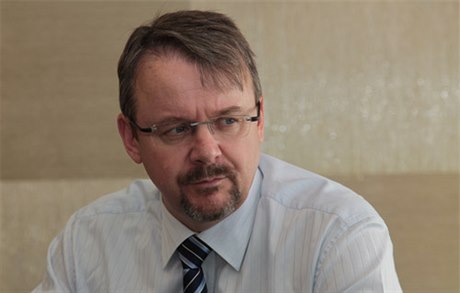Transport Minister Vít Bárta (Public Affairs, VV) on March 13 accused the Swedish-founded construction firm Skanska of cutting corners on projects for the state’s Road and Motorway Directorate (ŘSD) — and has erected signs along some roads denigrating the construction company’s work, reading “Skanska built here; we must repair it” alongside a frowning cartoon face.
Bárta claims that repairing the badly-built sections of road and motorway will cost taxpayers some Kč 1 billion and is demanding that Skanska foot the bill. Skanska Czech Republic managing director Dan ok, who insists the company did quality work, tells Czech Position that the builder is ready to sue the Transport Ministry if the controversial billboards are not removed.
ok had suggested that he and Bárta hold a round-table discussion with the participation of journalists to examine the issue. Bárta ignored the proposal and called a press conference at which he acknowledged his public campaign against the construction firm was “non-standard,” but said it would continue until Skanska “changes its conduct.”
ok told Czech Position in an interview that the Skanska will sue the Transport Ministry if it does not remove the signs tarnishing the constructor’s reputation.
Q: Do you intend to change your conduct in your dealings with the Road and Motorway Directorate (ŘSD) the transport ministry?
A: What fundamental changes should we make to our conduct? I think we operate with transparency and consistently. I have sent a letter to the ŘSD’s director, Jiří vorc, saying that if he has the impression that we don’t do something fast enough or sufficiently flexibly, I’ll be glad to meet with him. I would be glad for the outcome of that meeting to be assessed by a group of experts from the ŘSD and Skanska, whose task it would be to monitor the work to address the claims.
I’m expecting Mr. vorc to reply very soon. I don’t think our conduct is non-standard. On the other hand, I consider the signs [on the roads] and the criticism on television to which we could not reply to be extremely non-standard conduct which is unsuitable for a high-ranking government official.
Q: The claims were first presented to the public on March 13. When did you find out about them?
A: We knew about some of the claims because we are negotiating with the client about resolving them. We received the first ‘If Skanska were to cover everything, the costs would reach Kč 100 million. That’s one tenth of Kč 1 billion.’ complaint about two building projects on March 22. In one of those cases, there cannot be any claims because the section of road is still under construction.
Q: Who made the claims — the ŘSD or the Ministry of Transport?
A: I’ll leave that question without comment. For each contract we have a person assigned to process claims. We have reacted immediately to every letter we have received, but we’re really not able to respond to claims if we haven’t received any letter.
Q: The Transport Ministry has publically announced that the cost of repairing faults could reach up to Kč 1 billion. What’s your estimation of the costs?
A: If Skanska were to cover everything, the costs would reach Kč 100 million. That’s one tenth of Kč 1 billion. What’s more, we’re convinced that not all of the problems were caused by Skanska. The ŘSD, our partners and subcontractors should share the costs of repairing the faults.
We have to choose what kind of motorways we want.
Q: The Ministry of Transport claims that in comparison with other firms Skanska offer the lowest price discounts. Sometimes discounts are confused with savings. What’s the difference?
A: It’s very difficult to talk about discounts in public tenders. If we were to provide a discount, according to the agreements closed it would be grounds for terminating a contract [according to regulations on public tender contracts, it’s not possible to alter the winning price offer – ed]. In a presentation on the ŘSD website, the term “savings on joint building projects” is used. I would like to state that Skanska is not aware that we have not been willing to look for joint savings. There are possibilities for making savings and we’re open to discuss them.
Q: In which areas?
A: The main potential area we see is in factors which influence construction costs, but which don’t directly relate to the actual motorway — things such as the number of junctions, number of bridges and the demands of local administrations, which set the conditions for the consent required for the issue of construction permits. The other area where we can achieve savings is if we don’t build what’s not important. We have to choose: If we want ecological, beautiful and comfortable motorways, then all of society must agree to it. ‘The unit prices of materials used for our roads are well below the European average.’
Q: Which countries have chosen the latter option?
A: Austria for example. There it was decided that they want to be ecological and have perfect motorways and they allocate funds accordingly. In Poland, on the other hand, motorways are being built that don’t have certain elements of comfort. The Poles are giving preference to having a larger motorway network, rather than the motorways being beautiful.
Q: And what about savings on the side of the construction companies?
A: This suggests we have some reserves. If you look at our financial results, you will see that we have standard [profit] margins which don’t reach astronomical sums. In tenders we offer unit prices for materials. Size and quantity depend on the project. We don’t influence this.
Q: Are the unit prices comparable to those in other countries?
A: The unit prices of materials used for our roads are well below the European average. I recently read a blog in which the poster claimed that motorways in the Czech Republic are overpriced threefold. According to him, this means that Skanska must make adjustments to its balance sheet because the company’s results lie and hide profits. I would ask this man to check this with KPMG, which does our audits, and the Financial Office. I’ve never heard such blatant nonsense.
Q: Previously, you stated that you wouldn’t participate in a public tender if you suspected a hint of corruption. Have you not participated in a tender because of corruption?
A: I would put it another way. We want to compete and we want equal conditions. If we have the impression that the conditions don’t guarantee a fair competition, we protest and challenge the conditions. We don’t want to pledge that we won’t participate in tenders.
Q: In your opinion what measures should be introduced to the new law on public tenders to counter corruption?
A: I would be glad if it wouldn’t be possible to select fewer bidders in the first round by drawing names from a hat. It’s important for there to be measurable criteria for selecting a winner. It should be compulsory for these aspects of offers, including price, to be read out when the envelopes [containing offers] are opened.
At present the standard practice is for envelopes to be collected, passed to a law firm or somewhere else where they are evaluated anonymously and then the winner is announced. The public tender process should be as transparent as possible.
Q: Going back to the dispute with the ŘSD and the Transport Ministry, which has placed signs claiming that Skanska is responsible for the poor state of certain sections of roads — and you have demanded that they be removed. What further steps do you intend to take?
A: In the letter to ŘSD director Mr. vorc, I requested him to remove the signs because there’s no reason for them. I think that, according to the laws on competition, they are illegal because they put one competitor at a disadvantage and they are also damaging to reputation. The signs give the impression that only Skanska is to blame for all of the problems on the roads, and that’s not true. I think that [vorc] should react seriously to what is a serious appeal. If this is not done, we will consider turning to the courts. ‘This is so irregular that I’m not able to explain to our directors that something like it is possible in Europe in the 21st century.’
Q: You reacted to the transport minister’s televised press conference by saying that arbitration is an extreme way to settle a dispute. In what circumstances would you be prepared to take such a measure?
A: It really is an extreme solution. For the client to debate with the contractor through the media is misfortunate and undignified for both sides. We consider that we should put a stop to it. If things become heated and reach an extreme, it will be up to our owners to decide what to do to protect their investments.
Q: Has it happened anywhere that Skanska has gone to arbitration?
A: This has never happened. It’s very difficult to explain to the bosses in Sweden that communication with the customer is being conducted through the minister and a television discussion program. This is so irregular that I’m not able to explain to our directors that something like it is possible in Europe in the 21st century.
Q: I recall that some years ago Skanska had problems on the Russian market….
A: It was something different. There, the company discovered that basically it was impossible to operate on the Russian market without corruption. The company therefore decided to leave the Russian market, but it did not result in any arbitration.
See related article: Bárta claims Skanska ‘cut corners’ on road works


